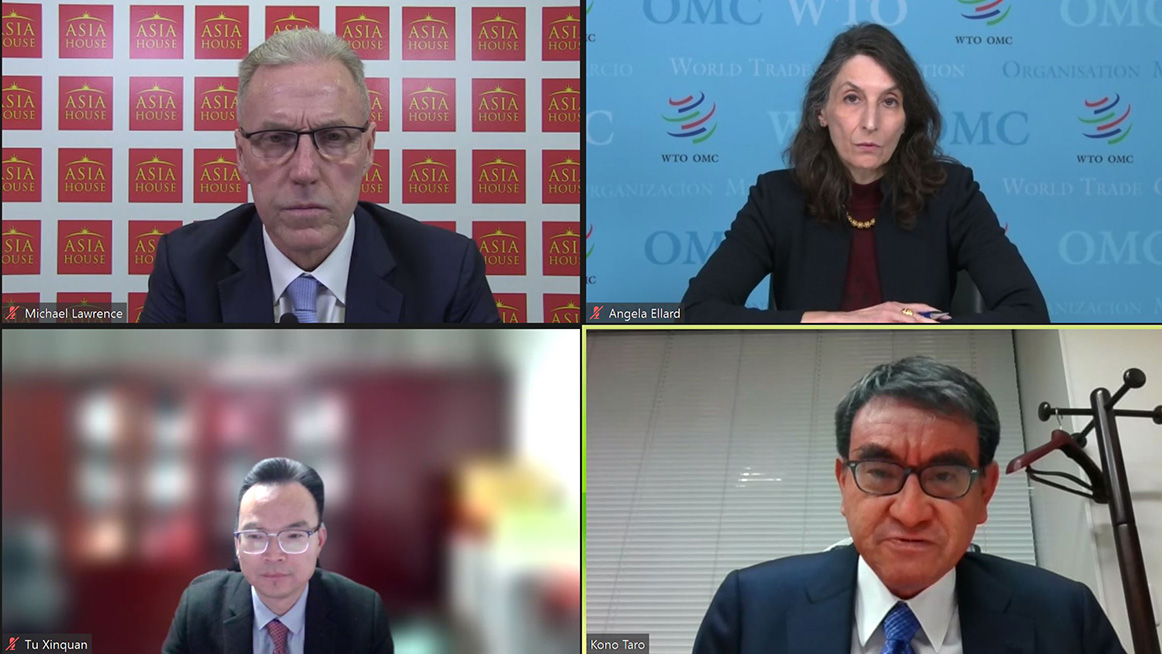Driving commercial and political engagement between Asia, the Middle East and Europe
Driving commercial and political engagement between Asia, the Middle East and Europe
Driving commercial and political engagement between Asia, the Middle East and Europe

Geopolitical tensions will continue to hinder global trade in 2022, even as officials seek to update rules on digital trade and boost sustainability, leading policymakers told this year’s Asia House Global Trade Dialogue.
WTO Deputy Director-General Angela Ellard joined Japan’s former Foreign Minister Kono Taro and trade expert Xinquan Tu to discuss the geopolitical forces shaping global trade during Asia House’s flagship conference, sponsored by Arup.
The dialogue was convened amid a rapidly changing global trade landscape, with the COVID pandemic continuing to cause disruption and the world’s largest trade deal, RCEP, soon to be ratified. The Comprehensive and Progressive Agreement for Trans-Pacific Partnership (CPTPP) is also emerging as a flashpoint for tensions, with China expressing interest in joining the agreement and the US continuing to stay away. South Korea is the latest economy to outline an ambition to join the partnership – a proposal that Kono Taro took issue with.
“The South Korean judiciary branch needs to fix several issues relating to international law. If they do it, they will be welcome to CPTPP,” he said, adding that Seoul must scrap an “unscientific” ban on certain food imports if it wanted to join a regional trade pact.
The biggest source of global trade tensions, however, remains the long-running dispute between the US and China, with tit-for-tat tariffs hitting the world’s two largest economies.
Taro accused China of using trade for political purposes and called for tougher rules on making domestic supply chains more self-reliant.
In response to a US ban on some exports to China, Beijing adopted a policy of protecting its domestic supply chain and seeking to replace the banned components with local ones.
“This is basically a reaction to hostile foreign actions,” Xinquan Tu, Dean and Professor of the China Institute for WTO Studies at the University of International Business and Economics in Beijing, told participants.
Tu said the adoption of international rules since China joined the WTO 20 years ago had helped push through domestic reforms. In recent years, though, this had changed.
“Because of the rising hostility against China, it has become more difficult for Chinese reformists to convince a Chinese audience that international rules are fair and good,” he said.
Both Taro and Xinquan agreed global trade rules needed reform. Taro said Japan would like to take the lead in formulating rules on digital issues, including trade in data.
World Trade Organization Deputy Director-General Angela Ellard said members and officials agreed reform was needed to make the WTO more fit for purpose.
“The transition to digital trade as well as the transition to a sustainable economy are the two biggest challenges we face,” she said, adding that talks on digital trade were underway through the WTO.
Ellard said the organisation should consider working on a global carbon pricing mechanism, something many experts see as a major tool in curbing harmful emissions.
“The bottom line is that we need rules when it comes to the environment and sustainability, and the WTO can really help there,” she said.
The discussion was chaired by Asia House Chief Executive, Michael Lawrence.
